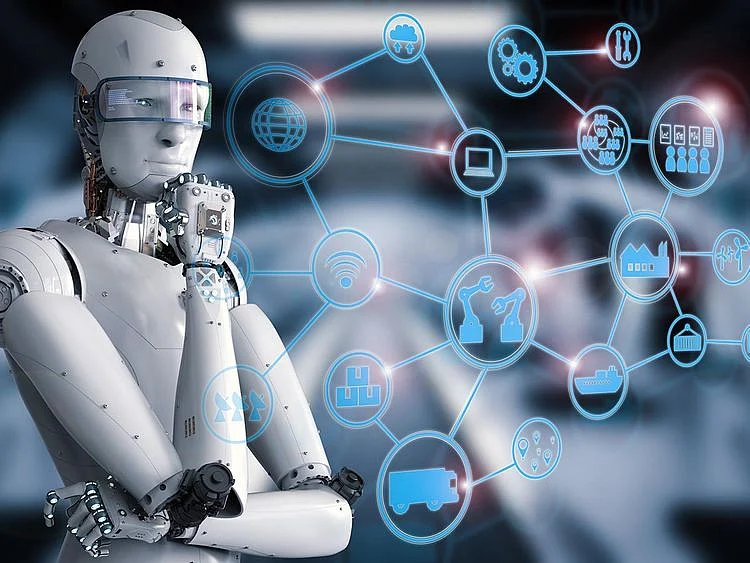Digitisation, automation, high-performance robots … everyday, advertisements in media anticipate the great disruption and replacement of humans by Artificial Intelligence (AI).
In the 19th century, Andrew Ure (Scottish economist, doctor and founder of the Andersonian Institution) asserted that perfect factories would be without workers. More recently, Jeremy Rifkin (American essayist, specialist in economic and scientific forecasting) prophesied “The end of work”.
First, what exactly is AI and what’s the process based on?
Conceptualised in 1955 in the US under the leadership of young researchers, wishing to have computers perform what the human brain does, especially tasks deemed to require intelligence.
These researchers had backgrounds in psychology, mathematics, logic and electronics.
The idea was to create a form of intelligence that comes from machines. It is therefore a process of imitation of human intelligence, which is based on the creation and application of algorithms executed in a dynamic computing environment, and whose purpose is to allow computers to think and act like human beings.
Currently in accordance with ISO 2382-98, Artificial Intelligence is the “ability of a functional unit to perform functions usually associated with human intelligence, such as reasoning and learning”.
With Artificial Intelligence, we are entering a brave new world. Currently scientists have a phenomenal amount of data and the computational power required to operate them, without forgetting the recent advances in neuroscience which have perfected the algorithms on which Artificial Intelligence is based.
Work, media, health, finance, economy, weapons systems, computers, transport, communications, human services … you name it. AI is already disrupting our daily lives. And it won’t stop there. Artificial neural networks are making significant progress in image recognition, text analysis. It can identify skin cancers, prostate or respiratory diseases with a high hit rate.
AI detects legal anomalies in contracts of several dozen pages faster than a seasoned lawyer. It drives autonomous cars in the dense traffic of big cities with an extremely low probability of accident. Coupled with other learning systems, these neural networks are also beating our best champions in chess and video games.
On the occasion of the 250th anniversary of the birth of Ludwig Van Beethoven, for instance, an AI set out to finish the 10th Symphony of this German prodigy, who wrote only the first notes before his death.
The multiplication of AI will mainly increase the domination of GAFA (Google, Amazon, Facebook, Apple) and serve as a springboard for the Chinese web giants Baidu, Alibaba and Tencent. It is no coincidence that Google and Facebook employ the majority of data scientists in the world. It’s the battle for Artificial Intelligence, and for technology in general.
The French government is expected to invest more than €2 billion over five years as part of a “ChooseFrench” strategy. This programme also aims to attract foreign talent and high-level international scientists in AI, in order to ensure the teaching of the subject matter.
Today we are also witnessing an academic and media bubble around AI. Global research in this field is exploding, as currently demonstrated by the number of scientific articles, advancing promising success.
AI has critics also, who highlight the pitfalls of technology, all of which brings us to the question: Are we really in danger? Will machines win? Responding to these fears leads us to ask where does the human brain get its intelligence?
The brain is a network of nearly a hundred kilometers of blood vessels. It is also two hundred billion cells, the whole weighing about a kilo and a half.
In the brain, everything always starts with two cells communicating with each other at a given point and which then diffuse in a circuit.
A single cell can make five thousand contacts.
Multiply this number by the two hundred billion cells and you will have what generates brain intelligence. Or about a million billion interactions, in three words: very nice machine.
But the brain is also, feelings, emotions, and the memorisation of the complex interactions of social, family, spatial and cultural life. A mind that is not only mathematical, but also polymath and critical.
On the other hand, the brain spends its time anticipating possible situations from the information it perceives from our senses. it puts them intoperspectively with what it already has in memory.
Thanks to this, brain constantly tries to predict and anticipate what is going to happen. The brain is also busy 24 hours a day as it analyses sugar levels, need to sleep, eat, drink and exchange emotions.
The brain is a consciousness correlated to the choices it must make between the possibilities that may arise.
According to the Salk Institute, our brain could store one petabyte (memory or data storage capacity that is equal to 2 to the 50th power of byte) of data.
The Artificial Intelligence of each GAFA would store a thousand times more data. Certainly, AI systems are capable, in their areas of specialisation, to surpass us. They reason faster, from more information, and more reliably than humans.
But in reality, algorithms are content to respond to extremely precise tasks and are unable to have reasoning outside their domain, encouraging researchers to work actively for the development and improvement of intelligent machines.
AI has a much wider spectrum of interests and the reason is simple: the human brain has multiple capacities, which range from reflex activities to “reflective” activities.
It is difficult to imagine the coding and algorithms reproducing an Artificial Intelligence equipped with analytical and critical consciousness that can substitute human brain. A robot reasons, but it has no soul. A neurone is alive, a silicon component is not.
Dr. Barhdadi Hassan is a noted neurosurgeon with the Ministry of Health, Morocco
Sign up for the Daily Briefing
Get the latest news and updates straight to your inbox
Network Links
GN StoreDownload our app
© Al Nisr Publishing LLC 2026. All rights reserved.
